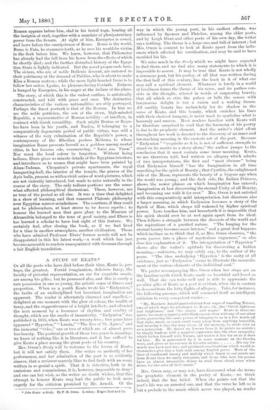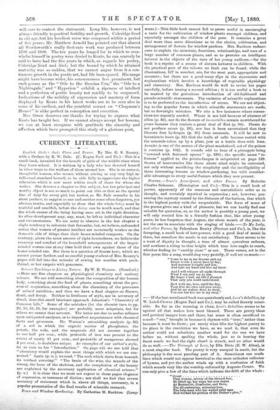A STUDY OF KEA.TS.* Or all the poets who have
died, before their time, Keats is, per- haps, the greatest. Fervid imagination, delicious fancy, the faculty of pictorial representation, an ear for exquisite music, are among his gifts ; but he possessed also, and this is surely a rare possession in one so young, the artistic sense of fitness and proportion. When as a youth Keats wrote his " Endymion," the faults of an undisciplined but luxuriant imagination are apparent. The reader is alternately charmed and repelled,— -delighted at one moment with the glow of colour, the wealth of fancy, and the suggestiveness of a bright intellect; and offended the next moment by a looseness of rhythm and crudity of thought, which are the marks of immaturity. "Endymion" was published in 1818, when Keats was twenty-two ; two years later appeared "Hyperion," " Lamia," "The Eve of St. Agnes," and the immortal "Odes," one or two of which are of almost peer- less beauty. The poetical growth of those two years is amazing ; we know of nothing like it in literature, and it has sufficed to give Keats a place among the great poets of his country.
Mrs. Owen's Study will be welcome to the lovers of Keats, but it will not satisfy them. She writes so modestly of her performance, and her admiration of the poet is so evidently sincere, that a reviewer scarcely likes to find fault with an essay written in so genial a spirit. That it is defective, both in its omissions and commissions, it is, however, impossible to deny ; and one can but wish, as the writer no doubt wishes, that this attempt to honour Keats may lead the public to look more eagerly for the criticism promised by Mr. Arnold. Of the * John Keats: a Study. By F. M. Owen. London : Kesan Paul and Co.
way in which the young poet, in his earliest efforts, was influenced by Spenser and Fletcher, among the elder poets, and by Leigh Hunt and other poets of his own day, the writer says nothing. The theme is a large one, and full of interest ; but Mrs. Owen is content to look at Keats apart from the influ- ences which affected his versification, and may be said to have moulded his life.
We miss much in the Study which we might have expected
to find there, and we find also many statements to which it is impossible to assent. It may be true that Keats is not wholly a sensuous poet, but his poetry, of all that was written during the first half of this century, has the least in it of what one may call a spiritual element. Whatever is lovely in a world of loveliness forms the theme of his verse, and its pathos con- sists in the thought, uttered in words of surpassing beauty,
that all which so stirs the pulses or lulls the senses with languorous delight is but a vision and a waking dream. All earthly beauty has melancholy for its shadow in the verse of Keats, and this beauty, which enriches his lines with their choicest imagery, is never 'used to symbolise what is heavenly and unseen. Most readers familiar with Keats will be therefore surprised to read that the harmony of his poetry is duo to its prophetic element. And the writer's chief effort throughout her work is devoted to the discovery of an inner and far-reaching meaning in the exoteric art of the poet. Because " Endymion " "exquisite as it is, is not of sufficient strength to stand on its merits as a story alone," the author jumps to the conclusion that it must contain some inner meaning. Keats, we are therefora told, had written an allegory which admits of two interpretations, the first and "most obvious" being that Endymiou himself "has the Imagination in all time searching for the spirit of Beauty ; that Cynthia, the enlightened side of the Moon, represents the beauty of a bygone age when the world was young ; and the dark side, the Indian Princess, shows the newer phases on which imagination has entered; Imagination at last discovering the eternal Unity of all Beauty, and. becoming one with it for ever." Mrs. Owen is not satisfied with this comparatively mild interpretation, but discovers also a larger meaning, in which Endymion becomes a, story of the Spirit of Man, which sleeps till wakened by higher spiritual power. Love touches him, and henceforth it is impossible that his spirit should ever be at rest again apart from its ideal. Then follows a struggle between the discords of the world and the aspirations of a purified nature. "The longing for the eternal beauty becomes more intense," and a great deal happens which inclines us to think that if, as Mrs. Owen observes, "the poem passes into a phase of mysterious vagueness," so also does her explanation of it. The interpretation of " Hyperion " shows also the writer's aptitude for discovering a hidden meaning,—unknown, we may safely say, to the author of the poem. "The idea underlying • Hyperion ' is the unity of all existence, just as • Endymion ' seems to illustrate the reconcile- ment of the various elements of the individual soul."
We prefer accompanying Mrs. Owen when her steps are on the familiar earth which Keats made so beautiful and loved so well. That she can write well and is able to appreciate the peculiar gifts of Keats as a poet is evident, when she is content to descend from the lofty flights of allegory. Take, for instance, the following passage, which will commend itself as intelligent
criticism to every competent reader. :— " Mr. Matthew Arnold particularizes four ways of handling Nature, two of which ways he attributes to Keats, viz., the Greek lightness and brightness,' and 'the charm and magic.' Keats in these re- spects has more sympathy with Shakespeare than with any of our other poets, possessing the same power of bringing to us in a few words all that sight, smelt, or touch could carry away from anything beautiful, and weaving it into the very tissue of the memory, to abide with US as a possession. He draws no lessons from it, he points no morals ; be simply leads us with a magical expression into the close sympathy which he has himself with Nature, and makes it lire for US US it does for him. He is penetrated by it in some measure as the Greeks
s were, and gives us its essence in his own nature Hi ear for
words was keen and fine, and produced combinations which would in themselves give him a high rank among English poets. More of the lines of condensed beauty and melody which linger in our minds are from Keats than we easily recognise, and those who love his poems have an almost irresistible desire to read them aloud, even when alone, for the sake of their music."
Mrs. Owen may, or may not, have discovered what she terms the prophetic element in the poetry of Keats,—we think indeed, that she has failed. When she points out that the poet's life was an arrested one, and that the verse he left us is but a prelude to the music which never was played, no reader
will care to contest the statement. Long life, however, is not always friendly to poetical fertility and growth. Coleridge lived to old age, but his loveliest verse was composed within a period of five years ; Mr. Matthew Arnold has pointed out that almost all Wordsworth's really first-rate work was produced between 1798 and 1808. The ten years he longed for in which to over- whelm himself in poetry were denied to Keats, he can scarcely be said to have had the five years in which, as regards his poetry, Coleridge lived and died; but the bound by which he attained maturity was so sudden, that we cannot augur from it a con- tinuous growth in the poetic art, had life been spared. His range might have become wider, his sensuousness less prominent, but such poems as the " Ode to the Grecian Urn," the "Ode to a Nightingale," and " Hyperion " exhibit a ripeness of intellect and a perfection of poetic beauty not readily to be surpassed. Indications of the nobility of expression and mastery of form displayed by Keats in his latest works are to be seen also in some of his earliest, and the youthful sonnet on " Chapman's Homer" is alike perfect in conception and execution.
Mrs. Owen deserves our thanks for trying to express what Keats has taught her. If we cannot always accept her lessons, we can at least recognise with gratitude the sincerity and affection which have prompted this study of a glorious poet,



































 Previous page
Previous page